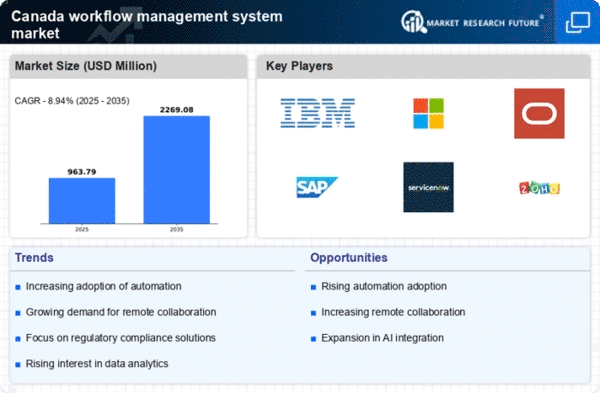Focus on Compliance and Security
In the context of the workflow management system market, compliance and security have emerged as critical drivers for Canadian businesses. With increasing regulatory requirements and data protection laws, organizations are compelled to adopt workflow management systems that ensure compliance with industry standards. In 2025, it is anticipated that 40% of Canadian companies will prioritize security features in their workflow management solutions. This focus on compliance not only mitigates risks but also enhances trust among clients and stakeholders. As a result, the workflow management-system market is likely to witness growth as businesses seek solutions that align with regulatory demands while safeguarding sensitive information.
Growing Need for Process Optimization
The workflow management system market in Canada is significantly influenced by the growing need for process optimization across various industries. Organizations are increasingly recognizing the importance of streamlining operations to enhance efficiency and reduce costs. In 2025, it is estimated that 35% of Canadian businesses will invest in workflow management systems specifically aimed at optimizing their processes. This trend is driven by the desire to eliminate bottlenecks, improve resource allocation, and enhance overall productivity. As companies strive for operational excellence, the demand for sophisticated workflow management systems that facilitate process optimization is expected to rise, thereby contributing to market expansion.
Increased Focus on Customer Experience
The workflow management system market in Canada is also shaped by an increased focus on customer experience. Organizations are increasingly aware that efficient workflows directly impact customer satisfaction and retention. In 2025, it is projected that 30% of Canadian companies will implement workflow management systems to enhance their customer service processes. By streamlining communication and task management, these systems enable businesses to respond more effectively to customer inquiries and issues. This emphasis on customer experience not only drives loyalty but also fosters competitive advantage. Consequently, the workflow management-system market is likely to grow as companies prioritize solutions that enhance their interactions with customers.
Integration with Emerging Technologies
The integration of emerging technologies such as artificial intelligence (AI) and machine learning (ML) significantly influences the workflow management system market in Canada. These technologies enhance the capabilities of workflow management systems by automating repetitive tasks and providing data-driven insights. In 2025, it is projected that around 25% of Canadian organizations will implement AI-driven solutions within their workflow management systems. This integration not only improves efficiency but also enables organizations to make informed decisions based on real-time data analysis. As businesses recognize the potential of these technologies, the demand for advanced workflow management systems is expected to rise, further propelling market growth.
Rising Demand for Remote Work Solutions
The workflow management system market in Canada experiences a notable surge in demand for remote work solutions. As organizations increasingly adopt flexible work arrangements, the need for efficient workflow management systems becomes paramount. In 2025, it is estimated that approximately 30% of Canadian employees work remotely, necessitating tools that facilitate collaboration and streamline processes. This shift drives companies to invest in workflow management systems that enhance productivity and communication among distributed teams. The ability to manage tasks, track progress, and ensure accountability remotely is crucial for maintaining operational efficiency. Consequently, the workflow management-system market is likely to expand as businesses seek to adapt to this evolving work landscape.
















